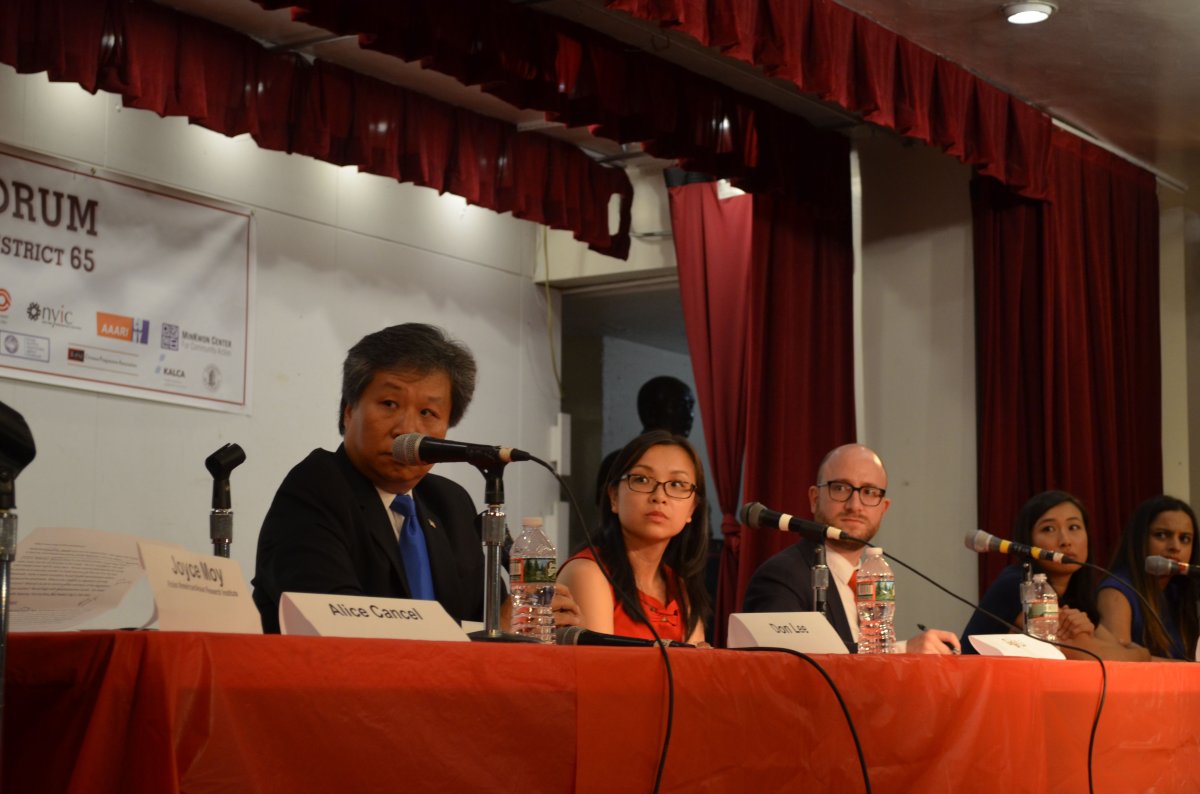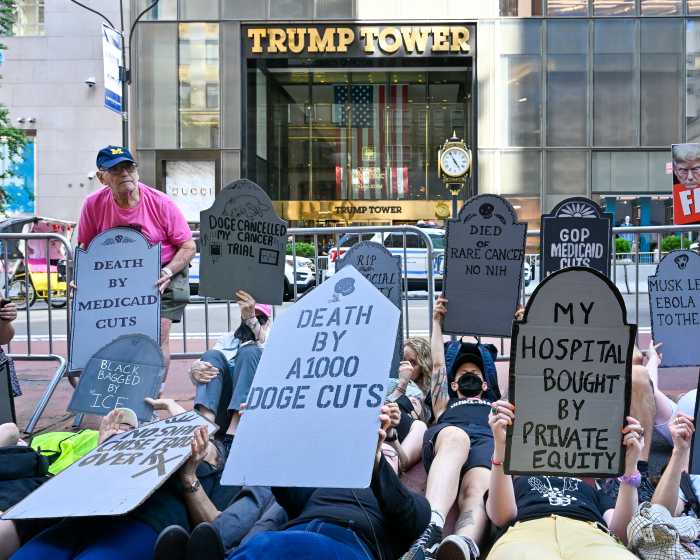
BY ALEX ELLEFSON | Campaign fundraising woes appear to have hamstrung Assemblymember Alice Cancel’s ability to connect with voters while she tries to fend off the first primary challenge to her newly won seat.
The freshman lawmaker — whose $13,554 in contributions is dwarfed by war chests of the five other Democratic candidates seeking the position once held by fallen Assembly Speaker Sheldon Silver — abruptly dashed out of a well-attended election forum Sunday in order to attend a campaign fundraiser.
The event, at which candidates discussed issues related to Chinatown and the Lower East Side, drew a crowd of more than 300 people and was sponsored by 20 organizations. Cancel’s absence during the second half of the debate rankled some audience members, who felt their new representative would rather glad-hand donors than make her case to constituents.
“She’s not getting my vote,” said Chinatown resident Annie Tan. “Hundreds of people came to this event. She could have planned the fundraiser at another time.”
Cancel’s sudden departure surprised event organizers, who said the assemblymember agreed to attend more than seven weeks ago.
“Two months of planning went into this and we had no inkling [Cancel] would not be there the whole time until she showed up,” said Liz OuYang, a political consultant for APA VOICE, the lead organization sponsoring the event. “I’m extremely disappointed because she was not able to respond to critical questions affecting the district.”
A campaign representative for the assemblymember — who scrambled out of the packed auditorium in the basement of the Chinese Consolidated Benevolent Association headquarters on Mott St. — said the scheduling snafu occurred because a personal friend planned a last-minute fundraiser that conflicted with the forum.
Susan Lerner, executive director for the good government watchdog group Common Cause New York and one of the moderators of Sunday’s forum, said Cancel’s exit gives the wrong message to voters.
“It sends a message about the priorities of her campaign,” she said. “The candidate made a choice to stand up the voters in order to take money from donors.”
Cancel, who struggled to attract campaign contributions ahead of the special election she won in April, is miles behind her opponents in the run-up to the Sept. 13 primary.
According to New York State Board of Elections campaign finance records, since April 15, Cancel has raised just $8,733. Meanwhile, over that same period, former Community Board 3 Chairperson Gigi Li has raised about 10 times that much, $88,811, and Chinatown activist Don Lee has raked in $65,177. The campaigns for District Leaders Paul Newell and Jenifer Rajkumar raised $77,376 and $130,422, respectively, in those four months. Yuh-Line Niou, former chief of staff for Queens Assemblymember Ron Kim, has raised $77,336 since April 15.
Although candidates were given no advance notice about what questions would be posed during the forum, Lerner lamented that Cancel was not present for a discussion about whether to ban outside income for New York lawmakers — an especially important topic, considering that Silver’s corruption conviction centered around nearly $5 million in alleged kickbacks from two law firms.
Among the remaining candidates, Rajkumar said she supported capping outside income at 25 percent of legislators’ salaries. The rest said they supported banning outside income.
Li added that state lawmakers should also have term limits. Newell proposed doubling assemblymembers’ salaries, so “we have the highest-quality legislators possible.”
The five remaining candidates said they would not hold another paying job while serving in Albany.
However, a question about whether candidates should be allowed to accept contributions from real estate limited-liability companies, or LLC’s, proved tricky for some of the candidates. Real estate LLC’s, formed to shield stakeholders from debt, can hide the true owner of a property and have allowed wealthy developers to funnel millions of dollars into legislators’ campaign coffers.
Newell, who hedged his answer by saying he does not accept “money from people with business before the State of New York,” received a $250 contribution from an LLC that controls one property in Manhattan, records show. Meanwhile, Rajkumar, who told the audience she does not accept real estate LLC money, received a $250 contribution from an LLC that owns New York property.
When asked about that contribution, Rajkumar said she understood the question to apply to “big real estate companies that dominate politics in New York,” instead of small property owners.
Indeed, the contributions are relatively small compared to the flood of political money distributed through LLC’s owned by some of the state’s largest developers. An analysis by Common Cause New York found that Glenwood Management, a real estate company implicated in the corruption trials that brought down Silver and former Senate Majority Leader Dean Skelos, used at least 50 LLC’s between the years 2005 and 2014 to contribute more than $12.8 million to New York State candidates and committees.
When asked about the real estate LLC money received by Newell and Rajkumar, Lerner acknowledged that the most pressing issue is closing the loophole that lets LLCs make donations as if they are individuals — allowing each LLC to contribute up to $60,800 per year to candidates. However, she said, candidates should have acknowledged any and all LLC contributions during the forum.
“We would like to see them be a strong example,” she said.
An analysis of campaign finance records also shows Li accepted a $500 contribution from the lobbying firm of James Capalino — who has been linked to the scandalous Rivington House property-flipping scandal. However, her campaign accepted the money before the city’s questionable decision to lift a deed restriction on the Lower East Side nursing home drew scrutiny from the press and investigators.
Li’s campaign manager said the money was returned as soon as they learned of Capalino’s connection to the Rivington House deal, and pointed out that the candidate — as former chairperson of C.B. 3 — was one of the first community leaders to raise the alarm about the change to the deed restriction.
Issues related to how the New York real estate boom has eroded the community’s access to healthcare, affordable housing and small businesses dominated the discussion at the forum.
During her time at the event, Cancel addressed several ways she hopes to preserve the community — including repealing the 1971 Urstadt Law that gives Albany control of rent regulation in New York City. She also proposed moving One Police Plaza out of Lower Manhattan, so that Park Row can once again become a free-flowing artery for New Yorkers and tourists to patronize Chinatown businesses.
Newell later said no one on the stage had the authority to move the New York Police Department’s headquarters, though he and the other candidates did propose other solutions to make Chinatown more accessible.
However, Cancel missed out on the opportunity to discuss other important topics, such as the Chinatown Working Group’s rezoning proposal aimed at buttressing the community against mega-developments, like Extell Development Company’s 80-story residential tower at 250 South St.
The Department of City Planning nixed the working group’s plan last year. However, the candidates said there are opportunities to continue negotiating with the city about rezoning the neighborhood, and vowed to support those efforts.
Chris Kui, director for Asian Americans for Equality, said it was encouraging to see the candidates court voters in Chinatown. He said he was pleased that they discussed affordable housing and preserving small businesses. However, he said, Cancel’s decision to leave early for a fundraiser showed “a lack of sensitivity toward the community.”
“I feel like people expected her to be here,” he said. “It’s important for everyone who runs for office to listen to talk about the issues and get feedback.”



































